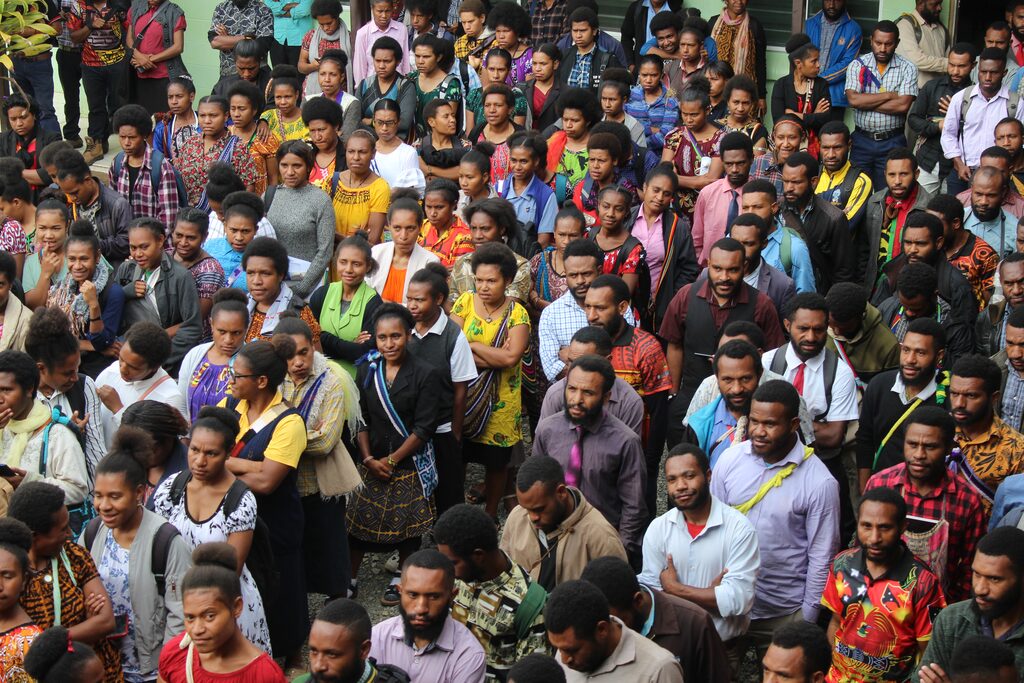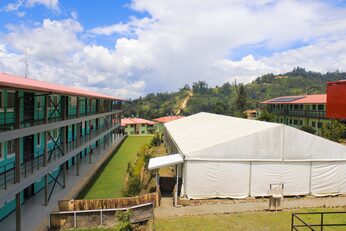Innovative University of Enga - Dept. of Education - Primary Teaching, Wabag
547 1056
Enga Teachers College (Innovative University of Enga - Dept. of Primary Teaching) was established in 2011. It is an educational institution located in Irelya, Wabag District, Enga Province, Papua New Guinea. This college was founded under the visionary leadership of Sir Peter Ipatas, the head of the Enga Provincial government. The institution was created with the aim of providing quality teacher education and contributing to the development of education in the region..
FOR 2024 ACCEPTANCE LISTS [ Nursing,Secondary,Primary & Early Childhood] DOWNLOADS


Enga Teachers College(IUE - Dept. of Edu - Primary Teaching ) and more
Enga Teachers College was established in 2011(Innovative University of Enga - Dept. of Education - Primary Teaching). It is an educational institution located in Irelya, Wabag District, Enga Province, Papua New Guinea.
This college was founded under the visionary leadership of Sir Peter Ipatas, the head of the Enga Provincial government. The institution was created with the aim of providing quality teacher education and contributing to the development of education in the region.
The college's inception in 2011 marked a significant milestone in the province's efforts to enhance its education sector and produce skilled educators to serve the local communities. Mr. Michael Homingu served as the founding principal, playing a crucial role in setting up the college and establishing its initial programs and infrastructure.
Over the years, Enga Teachers College (Innovative University of Enga - Dept. of Education - Primary Teaching ) has been led by dedicated educators and administrators committed to its growth and development. Among them, Mr. David Gomay took up the leadership reins, contributing to the college's educational mission and objectives.
Currently, the college is under the capable leadership of Mr. Philemon Antonio, who continues to steer the institution toward academic excellence and innovation. Under his guidance, the college is adapting to meet the evolving needs of the education sector and its students, striving to provide the best possible education and training to aspiring educators.
Enga Teachers College (Innovative University of Enga - Dept. of Education - Primary Teaching ) is a dynamic institution that is not only dedicated to teacher education but was operating as Transitional University as now it is a part and parcel of Innovative University of Enga.
This transition signifies the institution's commitment to expanding its academic offerings and services to provide a broader range of educational opportunities for the people of Enga Province and beyond. As it moves toward university status, the college is poised to make even greater contributions to the advancement of education and human capital development in Papua New Guinea.

Innovative University of Enga - Dept. of Education - Primary Teaching, like many teacher education institutions, offers different strands or specialized tracks within its programs. These strands are designed to provide students with focused training and expertise in specific areas of education. While the specific strands available at Innovative University of Enga - Dept. of Education - Primary Teaching may vary, here's a general overview of what these strands might entail:
Mathematics and Science Strand:
This strand focuses on preparing future educators to teach mathematics and science effectively.
Students in this strand deepen their understanding of mathematics and science concepts and explore innovative teaching methodologies.
They may engage in practical teaching experiences, emphasizing hands-on experiments and activities to make these subjects engaging for students.
Technology integration and data analysis may also be part of this strand to enhance STEM (Science, Technology, Engineering, and Mathematics) education.
Language and Literature Strand:
This strand emphasizes the teaching of language arts and literature, including reading, writing, speaking, and listening skills.
Students learn how to promote literacy, critical thinking, and communication skills in their future students.
The curriculum may include courses in linguistic theory, literature analysis, and creative writing.
Future language and literature educators may explore techniques for teaching English and local languages effectively.
Social and Spiritual Strand:
The social and spiritual strand may focus on holistic education, considering both the intellectual and moral aspects of learning.
Students in this strand learn how to foster social and emotional development, character education, and ethical values among their students.
It may also involve teaching about spirituality, religious tolerance, and values-based education.
Community engagement and service-learning could be integral components of this strand.
Community Development Strand:
This strand prepares educators to actively engage with and contribute to the development of local communities.
Students learn to conduct needs assessments, develop community projects, and collaborate with various stakeholders.
Emphasis is placed on addressing social and environmental issues, promoting sustainable development, and empowering community members through education.
Professional Development Strand:
The professional development strand may focus on enhancing the skills and leadership abilities of educators.
It includes training in pedagogical best practices, instructional design, and educational leadership.
Educators in this strand learn how to mentor and coach other teachers, lead professional development initiatives, and stay updated with current educational research and trends.
Special Education Strand:
This strand prepares educators to work with students with diverse learning needs, including those with disabilities.
Students learn about inclusive education, special education laws, and strategies for supporting students with different abilities.
Training may include individualized education plan (IEP) development and assistive technology integration.
Early Childhood Education Strand:
This strand focuses on the unique needs of young children and early childhood development.
Students learn about child psychology, curriculum development for preschool and early elementary grades, and effective teaching techniques for young learners.
Each strand at Enga Teachers College is designed to equip future educators with specialized knowledge and skills related to their chosen field. These strands reflect the college's commitment to preparing well-rounded, effective, and culturally responsive educators who can address the diverse educational needs of their communities. The specific strands available at the college may evolve over time to align with changing educational priorities and demands.
Quality learning and teaching at Enga Teachers College(IUE - Dept. of Education - Primary Teaching) represents a commitment to providing an education that is both effective and responsive to the needs of students and the broader educational community
A quality professional team at Enga Teachers College(IUE - Dept. of Education - Primary Teaching) is critical to the institution's success in delivering effective teacher education and fostering a positive learning environment. Such a team typically comprises faculty members, administrators, and support staff who are dedicated, skilled, and collaborative.
A quality smart learning environment at Enga Teachers College(IUE - Dept. of Education - Primary Teaching) is one that leverages technology and innovative educational practices to enhance the learning experience, improve educational outcomes, and provide students and educators with the tools and resources they need for success.
Brief on the College Data/Info
Enga Teachers College, like many teacher education institutions, offers different strands or specialized tracks within its programs. These strands are designed to provide students with focused training and expertise in specific areas of education. While the specific strands available at Enga Teachers College may vary, here's a general overview of what these strands might entail:.

Strands in educational institutions typically refer to specialized tracks or areas of study that students can choose to pursue. In the context of a teachers college, these strands are designed to prepare future educators with specialized knowledge and skills in specific subject areas or teaching methodologies.

A "Professional Development Strand" at Enga Teachers College would typically be designed to provide future educators with specialized training, skills, and experiences related to professional growth and development in the field of education.

This strand is essential for producing teachers who can effectively teach language skills, foster a love of literature, and help students develop strong communication and literacy abilities.

The "Community Development Strand" at Enga Teachers College likely focuses on equipping future educators with the knowledge, skills, and strategies needed to actively engage with and contribute to the development of local communities.

The "Social and Spiritual Strand" at Enga Teachers College is likely designed to provide students with a comprehensive understanding of social and spiritual aspects of education, as well as the skills and knowledge necessary to integrate these dimensions into their teaching practices.

The inclusion of an Information and Communication Technology (ICT) component within the Math and Science Strand at Enga Teachers College is a recognition of the pivotal role that technology plays in modern education, particularly in the fields of mathematics and science.
College's Organized Events
Celebrating PNG's 48th independence Anniversary
SPECIAL SERVICES
The upskilling program was offered on the 25th to 29th September 2023 for the Primary Teachers and also for the interested individuals. At the end of the Program students or the participants received the Certification of Attainment from the respective Units covered.
The program covers:
1.Standard Based Curriculum Planning and Programming.
( Standard-Based Curriculum Planning and Programming is an educational approach that centers on defining clear learning standards or objectives and then designing a curriculum and instructional activities aligned with these standards. This approach is widely used in modern education systems to ensure that students achieve specific learning outcomes and develop the skills and knowledge necessary for their academic and future success).
2.School Leadership and Management. (School leadership and management are critical components of effective educational institutions. They encompass a wide range of activities and responsibilities that aim to create an environment conducive to learning, facilitate the achievement of educational goals, and ensure the efficient operation of schools).
3.Information and Communication Technology (Basic Computing Skills -Basic computing skills are fundamental abilities that individuals need to navigate and use computers effectively. In today's digital age, these skills are increasingly important for both personal and professional purposes. )
For more informations, please DO NOT hesitate to contact us